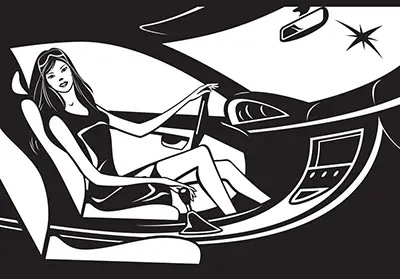Driving in Ontario for The First Time
Are you planning to drive in Ontario for the first time? Or maybe you’ve just rented a car but you’re not sure what to expect in Ontario? Of course, you need to be familiar with road rules in Ontario or else you could land yourself in serious legal trouble.
In this article, we’ll tell you everything you need to know if you’re driving in Ontario for the first time. Let’s get started!
 Graduated License System
Graduated License System
Ontario uses a graduated license system for driving license applications. That means if you’re a new driver, you’re restricted to driving with two learning licenses for a period of 20 months before you can be eligible for a full driving license. What are the requirements for the graduated licenses?
G1 License
If you’re 16 years and above, you can obtain a G1 license after you’ve passed an eye test and a written G1 test. Once you’ve acquired a G1 license, you can legally drive but with the following restrictions:
- You must be accompanied by a fully licensed driver with at least 4 years of experience.
- No driving between midnight and 5 a.m.
- You must have zero alcohol level in your blood while driving.
- Every passenger must wear a seatbelt.
- You’re not allowed to drive on high-speed expressways and 400 series highways.
The G1 license is valid for 5 years, but you can proceed to the next licensing stage after 12 months; if you attend a government approved driving school, you can proceed after 8 months.
G2 license
Once you pass the G1 road test, you can graduate with a G2 driver’s license. Unlike the G1 driving license, the G2 driver’s license comes with fewer driving restrictions. More succinctly, you can drive on any road in the province without an experienced driver on your side. Also, you’re not restricted to driving within a specified time frame unless you’re 19 years old or younger.
However, you still can’t drive with any alcohol content in your blood and all passengers must wear a seatbelt. After driving with a G2 license for 12 months, you can take another road test; if you pass, you can acquire the full driver’s license for Ontario.
Exchanging Your Driver’s License if You’re a Visitor
If you’re visiting Ontario, you can drive in Ontario with an out of province or country driver’s license for up to 60 days. But if you have an international driver’s license that has been translated to English or French, you can drive for up to 12 months in Canada.
Alternatively, you can exchange your out of province driver’s license for an Ontario license if you want to stay longer than 60 days. However, you can only obtain an Ontario driver’s license without taking a road test if you’re relocating from the United States, Belgium, Switzerland, New Zealand, South Korea, Austria, Japan, Australia, Germany, Northern Ireland, Taiwan, Republic of Ireland, Great Britain, the Isle of Man, France, Australia or any province/territory in Canada.
If your country doesn’t have an exchange program with Canada, you have to take the road test to acquire an Ontario driver’s license.
Traffic Laws in Ontario
If you’re driving in Ontario for the first time, here are a few things you should remember:
- Unlike in the United States, the speed limit in Ontario is posted in km/h. If you’re caught driving over 50 km/h over the speed limit, you could get fined up to $10,000 or your car will be impounded.
- If you’re a visitor with a driver’s license from New York or Michigan and you’re given a traffic ticket in Ontario; it will show up in your driving record back home. This is because Ontario has an agreement with those states.
- If you encounter an emergency vehicle with the lights on, you’re required by the law to come to a complete stop at the side of the road; this is to avoid impeding the emergency vehicle.
- It is illegal to use any hand-held communication device while you’re driving in Ontario.
- Drivers are restricted to a blood alcohol concentration of 0.08. However, if you have a blood alcohol concentration of between 0.05 to 0.08, you could still get fined.
- If you’re 21 years or younger, you’re restricted to driving with a blood-alcohol level of zero.
- If you see flashing green lights on the road, it means the opposite side of the road still has a red light.
- If you don’t comply with a police officer asking for a breath sample, you could get arrested and charged.
- If you’re convicted of a traffic violation, you could get a hefty fine and the offense will be on your record for at least 3 years.
- If you accumulate 9 demerit points with a full driver’s license, you could have your license suspended by the Ministry of Transport.

 Graduated License System
Graduated License System